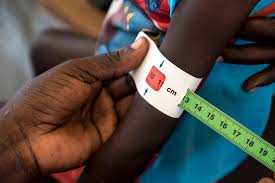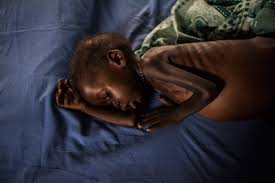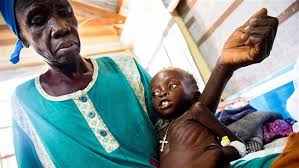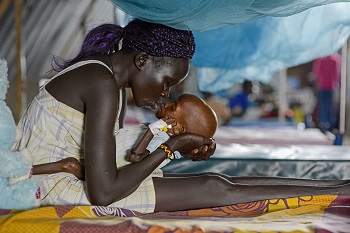Famine Declared In South Sudan
On Thursday February 23rd the Lord Speaker granted a rare urgent Private Notice Question – this, on the famine that has been declared in South Sudan:


Famine declared in South Sudan; 4.9 million people need urgent help
Famine in South Sudan has left 100,000 people on the verge of starvation and almost 5 million people, more than 40% of the country’s population, in need of urgent help, aid agencies say.
People are already dying of hunger, and another 1 million people are on the brink of famine, UN agencies said.
Now the UN World Food Programme and nongovernmental organizations are sounding the alarm, warning that more than a million children are suffering from acute malnutrition.
“Our worst fears have been realized,” said Serge Tissot, of the Food and Agriculture Organization of the United Nations. “Many families have exhausted every means they have to survive.”
“People have been pushed to the brink, [they are] surviving on what they can find to eat in swamps,” said Emma Jane Drew, Oxfam’s humanitarian program manager in South Sudan.
==========================================================================
South Sudan
23 February 2017
Private Notice Question
11.37 am
Asked by
To ask Her Majesty’s Government how they intend to respond to the unfolding famine in South Sudan.
My Lords, I beg leave to ask a Question of which I have given private notice. In doing so I should declare that I am an officer of the All-Party Group for Sudan and South Sudan.
My Lords, the humanitarian situation in South Sudan is deeply concerning; 4.9 million people do not have enough to eat and famine has been declared in Unity state. The Secretary of State this week announced a £100 million package of emergency assistance that will feed 500,000 people. We are monitoring the situation closely and working with other donors to prevent the famine spreading to other parts of the country.
My Lords, I thank the Minister for that response. Does he agree that the three-year civil war in South Sudan and the continuing conflict just north, in South Kordofan and Blue Nile in the Republic of the Sudan, have generated vast numbers of refugees and a consequential inability to grow and harvest crops, which should remain our priority in combating this man-made famine? What progress is being made in achieving this, obtaining access to closed areas in Unity state, and galvanising international efforts to save the lives of millions now at risk of starvation, malnutrition and famine?
I am grateful to the noble Lord for raising that point and for his work in the all-party group, which produced a valuable report just yesterday on the general situation in the region. He is absolutely right: many of the crises that we face are not man-made, but this one most certainly is. I have just left an emergency planning meeting with co-ordinating partners on the situation in Somalia, where some 6 million people are at risk because of famine. We are doing the best we can there, but in South Sudan the frustrating thing is that, although we committed £100 million, the UN Mission in South Sudan is in place on the ground and many humanitarian workers are risking their lives to deliver aid, unless there is implementation of the existing peace agreement, the future of the people in South Sudan, particularly women and children, looks increasingly bleak.
I congratulate the Government on their immediate humanitarian aid response and welcome the Secretary of State’s commitment to engage with other donors, including the EU. This is all good news. However, in making that announcement, she referred to this crisis being caused by war and conflict. Last week, we debated Sudan in Grand Committee. The Foreign Office Minister, the noble Baroness, Lady Anelay, referred to our work in support of the African Union. Can the Minister reiterate what we are doing to build sustainable peace efforts and trade? This comes back to our previous point that development is about not just humanitarian trade but building peace and sustainability, particularly in Africa.
The noble Lord is absolutely right and I appreciate his remarks. On the specific points that he mentions, we have supported and encouraged the work of the Intergovernmental Authority on Development—IGAD—which has led a lot of this work, and have worked through the UN Security Council on that. We have worked with international partners. We are part of the troika with Norway and the United States, which is key in intervening in this area. My noble friend Lady Anelay is looking at the work we are doing across the border, because, although some 3 million people are internally displaced, increasingly, as refugees flow across the border in search of support, that is destabilising other countries in the region. My noble friend Lady Anelay was in Uganda visiting one of the refugee camps. We have committed another £50 million of support in that regard. A huge amount has been done, but the UK cannot do this alone; the international community must step up to the plate. We need to see more action there.
My Lords, Radio Tamazuj in Juba reported on Tuesday that up to 5.5 million people are expected to be in food crisis in South Sudan by July. That is more than half the population. Pete Walsh, Save the Children’s country director in South Sudan, says:
“While the threat of a famine … has been looming for months, the worst-case scenario has … become a devastating reality”.
While the Government lead the response to Save the Children’s campaign in many other ways, can the Minister tell the House that we consider that the lives of a million children facing death by starvation must be a priority? Will we invest particularly in nutrition centres and in improving farming methods to make sure that food with nutritious value saves them from severe malnutrition?
The noble Lord, who knows a great deal about the African continent and has focused on this area, rightly puts his finger on the importance of nutrition. We had a very useful debate on that subject yesterday evening, in which we looked at the importance of that area. It is an area on which we are focusing our efforts and where we want to see further action. However, one of the great problems that we know of is that when there is a conflict situation, invariably it is in rural areas. People then leave those areas and go to urban areas, leaving the agricultural land untended and uncultivated. We are now coming to the peak growing season for food crops. Therefore, that movement of people has a double effect, which we must respond to.
My Lords, is the Minister aware that people are already dying in large numbers in remote areas? For example, the Anglican bishop of the diocese of Wau in Bahr-El-Ghazal has had to borrow money to buy food to save lives. He told me that he could not access DfID funding because the requirements are too bureaucratic and complex. What can be done to ensure that food reaches people in remote areas? Perhaps money can be made available through local NGOs, including the churches, which can reach all in need.
I am grateful to the noble Baroness, who has worked tirelessly in this area of South Sudan. I will shortly meet the noble Lord, Lord Curry, and the Anglican international aid workers to see what more can be done. The Anglican Communion can be a real instrument for peacebuilding in that part of the world. We want to do whatever we can to help it.
My Lords, I too congratulate the Government on the aid they are sending to Sudan. As we know, undernutrition and malnutrition disproportionally affect women and girls. Have the Government seen evidence that the aid they are sending is going to women and girls as well as men?
That is a good point, and why we are deploying an additional 400 troops as part of the UN mission to ensure that aid reaches the people for whom it is intended. The £100 million announced yesterday will provide food assistance for over 500,000 people, nutritional support for 27,500 children, and safe drinking water for 300,000 people.
My Lords, we cannot overstate the seriousness of the situation we face. As the Minister rightly said yesterday, this is only the second declared famine this century and we must do something about it. The European Union is the biggest donor of aid throughout the world. From my experience at DfID, may I make a specific practical suggestion? Why does our Secretary of State not ask for a special meeting of the development council, bringing together all the countries of Europe to consider what can be done, both bilaterally and multilaterally, before hundreds of thousands, if not millions, of people die?
It is a very good suggestion. I will take it away and discuss it with colleagues and then write to the noble Lord.
My Lords, I recently had a discussion with President Kagame of Rwanda and President Museveni of Uganda. These two countries, particularly Uganda, have absorbed the highest number of refugees from South Sudan. What more support can DfID give them?
I pay tribute to the work my noble friend does in that region as a trade envoy, which is important for the future. We are doing a great deal but more needs to be done. We know from these crises that the sooner the money gets there, the effect it has will be far greater than if it arrives two or three months down the line, so urgency is the message of the day.
My Lords, as I understand it, some food is available—the problem is that it is too expensive for people to buy. Perhaps there is some mechanism whereby the UK Government, or indeed a collection of Governments, might intervene to stabilise the market or even to reduce the prices so that that food can be bought.
The noble Baroness is absolutely right to raise that point. Inflation is now running at something between 500% and 800%, and that is where immediate cash transfers can come in. However, the Government of South Sudan need to take action themselves on controlling food prices, which has happened in other countries.

Follow Up Written Questions to The Oral Question Asked In the House
Lord Alton of Liverpool to ask her Majesty’s government, further to the reply of Lord Bates to the Private Notice Question on Thursday February 23rd, what humanitarian access is now available to NGOs in Unity State and what is their estimate of the percentage of South Sudan’s population that remains inaccessible to agencies seeking to provide food to those affected by famine.
Lord Alton of Liverpool to ask her Majesty’s government, further to the reply of Lord Bates to the Private Notice Question on Thursday February 23rd, how much new money has been allocated to alleviate famine in South Sudan: to whom it has been given; and how it is being used.
Lord Alton of Liverpool to ask her Majesty’s government, further to the reply of Lord Bates to the Private Notice Question on Thursday February 23rd, and further to DFID’s statement that “new UK support to provide lifesaving food, water and emergency healthcare which will save more than a million lives in each country” is being provided in South Sudan, how much of the “new” money had not already been allocated for use in South Sudan at a later date.
Lord Alton of Liverpool to ask her Majesty’s government, further to the reply of Lord Bates to the Private Notice Question on Thursday February 23rd why
DfID have refused to disclose when the “new” money to help famine victims in South Sudan money was signed off; why they will not clarify the identity of the intended recipients – whether the South Sudanese government, NGOs or UN agencies – and what “security concerns”, which they cite, can justify withholding this information.
Lord Alton of Liverpool to ask her Majesty’s government, further to the reply of Lord Bates to the Private Notice Question on Thursday February 23rd , what progress has been made in ending South Sudan’s civil war and how many people they estimate have been displaced or have become refugees as a consequence of both the war and the conflicts in the neighbouring areas of the Republic of Sudan.
Lord Alton of Liverpool to ask her Majesty’s government, further to the reply of Lord Bates to the Private Notice Question on Thursday February 23rd, who is coordinating international efforts to help the victims of the famine in South Sudan and what meetings the Minister and Secretary of State have convened with their international counterparts to ensure an effective response to the famine.
Lord Alton of Liverpool to ask her Majesty’s government, further to the reply of Lord Bates to the Private Notice Question on Thursday February 23rd, what is their estimate of the number of children in South Sudan now affected by malnutrition.
Lord Alton of Liverpool to ask her Majesty’s government, further to the reply of Lord Bates to the Private Notice Question on Thursday February 23rd what new initiative they are taking to stop the fighting, curtail the flow of weapons, and bring about better conditions for humanitarian aid to reach the people of South Sudan.
Lord Alton of Liverpool to ask her Majesty’s government, further to the reply of Lord Bates to the Private Notice Question on Thursday February 23rd whether they intend to ask the U.N. Security Council to reconsider the motion to impose an arms embargo on South Sudan that failed last year.

Earlier in the week the All Party group on Sudan and South Sudan launched our new report on the region. Click here to read it:
“Engagement Beyond the Centre: An inquiry report on the future of UK-Sudan Relations”: http://reliefweb.int/report/sudan/engagement-beyond-centre-inquiry-report-future-uk-sudan-relations
Also read these reports on the famine:
Reports on “ South Sudan in Crisis as Famine Ravages World’s Newest Country “may be viewed at:
http://www.nbcnews.com/slideshow/famine-struck-south-sudan-n724016
http://edition.cnn.com/2017/02/20/africa/south-sudan-famine/

